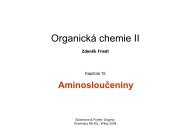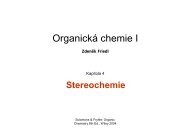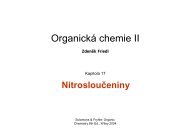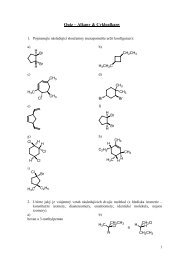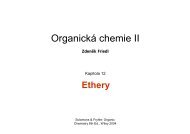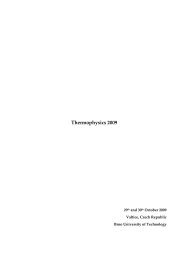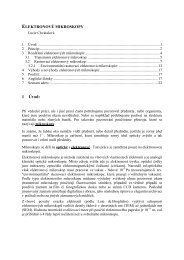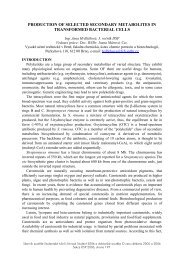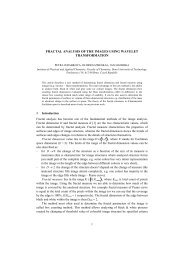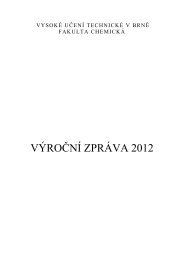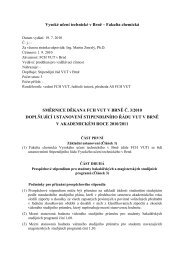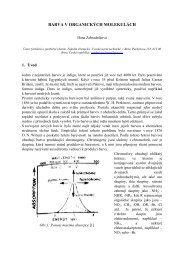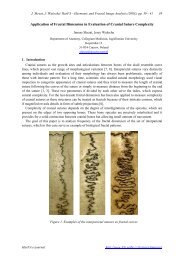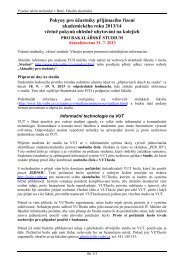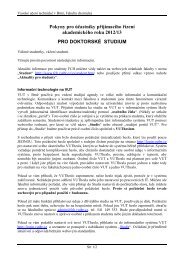2. ENVIRONMENTAL ChEMISTRy & TEChNOLOGy 2.1. Lectures
2. ENVIRONMENTAL ChEMISTRy & TEChNOLOGy 2.1. Lectures
2. ENVIRONMENTAL ChEMISTRy & TEChNOLOGy 2.1. Lectures
You also want an ePaper? Increase the reach of your titles
YUMPU automatically turns print PDFs into web optimized ePapers that Google loves.
Chem. Listy, 102, s265–s1311 (2008) Environmental Chemistry & Technology<br />
•<br />
•<br />
each vocabulary section is competed with a hyperlink<br />
going to Merriam-Webster on-line dictionary which is<br />
soundtracked<br />
each lesson is completed with a substantial number of<br />
hyperlinks going to various sound tracked specific articles,<br />
animations, video recordings, demonstrations etc.<br />
that can be utilized for this purpose.<br />
Exposing students to the culturally authentic sources as<br />
much as possible. (e.g. videotapes, radio and TV broadcasts,<br />
films, songs etc.) – this material has long been advocated<br />
by foreign language educators as stimulating pedagogical<br />
aids. One of the best sources of the authentic materials for<br />
classroom instructions is the Internet. Target language sites<br />
accessed through the Internet offer both teachers and students<br />
a wealth of authentic materials. The advantage of such<br />
materials is that they are current and readily available. Their<br />
topicality can be easily maintained by the regular visits of<br />
these web sites. That is why we completed the individual lessons<br />
with hyperlinks going to various specific video sections,<br />
songs, soundtracked animations, classroom instructions etc.<br />
However, it is important to remember, that the documents<br />
found on the Web, like all authentic materials, have<br />
been created by and for native speakers of the language.<br />
That means they are not written with the language learning<br />
in mind. For this purpose we assessed these documents from<br />
the perspective of their general understandability first. Then<br />
we have completed these materials with the tasks that suit<br />
even the less proficient students.<br />
Ad (ii) The different language experience of our students<br />
We tried to meet the needs of the less proficient students<br />
by creating each textbook lesson in two versions. Firstly it<br />
is a printable version which the student will print and bring<br />
with him/ her to the class. Its format leaves plenty of space<br />
for writing down student’s own answers. Secondly, each unit<br />
has also the version completed with the clues to all exercises.<br />
This serves mainly to the less advanced ones to go through<br />
the explain subject matter at home again and check their<br />
answers or possibly to look up the correct answers.<br />
Besides, each lesson is ended with a short self test enabling<br />
the students to evaluate their comprehension.<br />
Ad (iii) Unwillingness to learn vocabulary and idioms<br />
by memorizing<br />
Experts say that most of people must hear a new word<br />
30 times to remember it forever. To know a word and instantly<br />
understand it, you probably need to hear it 50–100 times. The<br />
students must know that it is not enough to listen to a new<br />
word just once or twice. As the time allocation of our classes<br />
do not allow to practice repetitive listening to much at school,<br />
the students are strongly recommended to go to all the listening<br />
material again at their leisure, e.g. at home, and repeat<br />
all the listening activities as many times as possible.<br />
Ad (iv) How to engage the students who are tired from<br />
the previous “more important” classes? The answer is: make<br />
the English for chemists fun.<br />
s349<br />
Here the Internet makes a great aid again. We can use<br />
various science/chemistry oriented humor, interactive quizzes,<br />
crossword puzzles and various songs created by native<br />
students and teachers with the aim to bring fun and entertainment<br />
into their chemistry classes. Songs make excellent<br />
memory boosters. AS most people have strong musical<br />
memory, we take can advantage of this fact to make memorization<br />
and learning easier. Putting words to music instantly<br />
makes those words more memorable.<br />
Besides memorizing song verses our learners can profit<br />
from retelling the jokes, playing memory boosting quizzes<br />
(e.g. flash cards), solving crosswords etc.<br />
This can be effectively completed with the popular game<br />
based on the repetition of the words. Everybody who has ever<br />
visited a language school will sure the remember the game<br />
called: In our local super market we can buy/I will pack into<br />
my suitcase … Its variations on the premises of our school<br />
sound: In our chemistry laboratory we have … (the names<br />
of various laboratory equipment follow) .../Breathing carbon<br />
monoxide will cause… (Symptoms of CO poisoning)/Iodine<br />
deficiency causes… etc, etc.<br />
Ad (v) Shyness to speak<br />
During a semester students must prepare their own mini-<br />
presentations to meet one of the necessary conditions of getting<br />
a credit. Prior this activity they are provided with all the<br />
necessary phrases and expressions so that they learn how<br />
to address the audience, introduce themselves, express the<br />
purpose of the paper/presentation, signpost the presentation,<br />
move on in the course of it, describe the pictures, verbalize<br />
graphical data, ask checking-up questions, invite questions,<br />
finish the presentation… Though the students are encouraged<br />
to use the topics which have been explained in the classes,<br />
they widely use the Internet again as a rich source of additional<br />
information.<br />
We managed to incorporate two funny chemistry oriented<br />
dramas into a lesson. The plays come from the Internet<br />
and where created by the native authors without the language<br />
learning objective. However, our students find them<br />
very entertaining and participate enthusiastically in dramatic<br />
readings.<br />
This activity also fits a multilevel class as the students<br />
are given the freedom in adapting the sentences. So the less<br />
advanced can make their entries less complicated and simpler,<br />
while the more advanced ones enjoy the full versions of<br />
their roles. Dramatization engages students emotionally and<br />
socially, as well as intellectually. The students thoroughly<br />
enjoy it, and it leaves strong, memorable impressions which<br />
can later help recall and improve learning. Thus at the end of<br />
the activity they are able to repeat various catch phrases by<br />
heart (e.g. thanks to the plays “Becoming an alcohol – a sad<br />
story of good oxygen becoming bad”, or “Electrophilic Addition”<br />
they will long remember structures as: “My mom has<br />
always warned me against organic acids”, “It is against the<br />
rule. What rule? Markovnikov’s rule!” Aren’t my electrons<br />
good enough for you? “Along comes electron hogging



